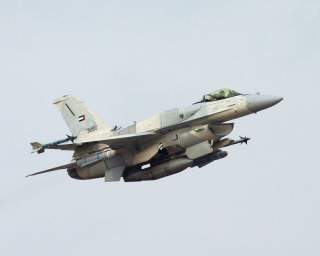The UAE and Egypt’s New Frontier in Libya
"For Washington, this is potentially a salutary development, but it also reveals the transition from a U.S.-led regional-security arrangement to something beyond U.S. control."
The surprising news that Egypt and the United Arab Emirates (UAE) have carried out airstrikes against various Islamist rebels in Libya is yet another example of the scope and extent of change in the Middle East. It reminds us that many of the time-tested assumptions about how states behave have to be checked and challenged. The fact of military activism by two important Arab states is on some levels a positive development, but introduces some new practical and political variables.
Egypt and the UAE have been crystal clear about how they view the rapidly expanding threat from Islamic extremists in the region in general. The emergence of General, now President, Sisi in Cairo has reassured Gulf Arab leaders that the destabilizing effects of the Arab spring can be reversed. They want to reestablish state control and see forces for law and order prevail over extremist groups that have exploited the post-authoritarian moment in several Arabs states. In the Libyan case, they presumably acted to reverse the chaos and confusion of competing armed groups and a very weak central government, and to support General Khalifa Haftar, who is leading anti-Islamist factions as an independent actor, not on behalf of the Libyan state. This has led to speculation that Egypt and their purported military ally, the UAE, would like to see General Haftar in power to tame the centrifugal forces and restore some semblance of order in Libya.
If more information confirms the action by the UAE from Egyptian bases, the development represents a shift in tactics if not strategy that will yet again change power balances in the region. It reveals first and foremost how profoundly threatened some key Arab states feel by the rise of Al Qaeda, its affiliates and the even more extreme and lethal Islamic State. Secondly, it shows how the threat environment and increased military capacity has led the UAE and potentially other Gulf states to act independently of their key security partners, principally the United States.
Early signals from senior U.S. officials suggest that this show of independence has not been appreciated. But there’s a question about whether the United States was really blindsided, and whether some action in Libya was not in fact desired, even if publicly disavowed. The UAE had contributed to the coalition that ousted Muammar Qaddafi, so the return of its fighter planes to Libyan airspace reflects a genuine commitment and priority of Abu Dhabi’s rulers. There’s no guarantee that air support to the offensive by General Haftar will achieve its intended purpose, and control of the Tripoli airport remains in rebel hands. But there should be no doubt that the UAE and Egypt have a strategic interest in stabilizing Libya, and appear more willing to take risks to achieve it than Western donors who have been strangely passive as Libya unravels.
The United States has also urged regional states to take more responsibility for conflict management and resolution. It is a core tenet of the so-called Obama doctrine globally. This demonstration of regional ownership and leadership, therefore, in theory comports with U.S. goals. But it also raises concerns and introduces new uncertainties at a dangerous and volatile moment in the region.
Most defense experts would not see the UAE and Egypt as able to sustain operations over an extended period of time, should their initial action fail to achieve desired outcomes, as occurred when EU states led the campaign to oust Qaddafi and ran into supply problems. They would also see a reluctance to coordinate with other interested and engaged parties as a serious weakness that could exacerbate regional tensions. It is possible that NATO countries nearby or other GCC states would be willing to provide support, but a political process to explore options is required, under NATO’s Mediterranean protocols or more ad hoc arrangements, if need be.
More information will appear in the coming days, but this latest surprise from the region is a sign of the times. The Middle East is more chaotic, with sustained violence and conflict in nearly a half-dozen states. At the same time, the rising middle powers of the region, including the financially dynamic countries of the Gulf, the UAE in particular, are increasingly willing to take matters into their own hands. For Washington, this is potentially a salutary development, but it also reveals the transition from a U.S.-led regional-security arrangement to something beyond U.S. control.
Ellen Laipson is the President and CEO of the Stimson Center.

